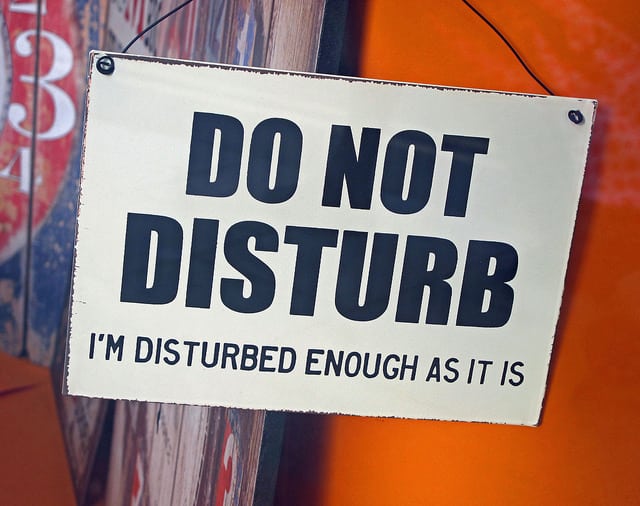Not long ago Dolce and Gabbana found themselves in Sir Elton John’s bad books after he deemed their comments about surrogate parenting to be offensive. Judging by his reaction – instigating a boycott of D&G clothing on social media – he may have thought that they had no right to say such things. It is remarkable that this should occur so soon after commentators were trenchantly defending the right to offend in the wake of the Charlie Hebdo attacks. Have the rules changed already? In this essay I hone in on two questions which might help us to find a secure footing on a shifting terrain: first, what conditions does the internet need to provide to facilitate fruitful exchanges? And secondly, how do we, as readers and authors, best make use of these proposed conditions?
The first thing we need is an online space where ideas can be spoken about on a general level, without reference to anybody’s particular circumstances. Sometimes this principle is adhered to and sometimes not. For example, when people suggest that fossil fuels ought to be kept in the ground for fear that burning them will raise the planet’s average temperature by more than 3.6ºF, this is generally not interpreted as a personal attack on Joe Burgess, 27, newly-wed, who happens to work on an oil rig in Alaska. It’s not taken as a direct attack because it isn’t one – it’s a general observation.
However, if people start discussing the general welfare of children who are deliberately separated from a biological parent at birth due to a surrogacy arrangement, anyone who expresses concern is deemed to be taking aim at Sir Elton’s children, even though they were never mentioned. While there might well be a disagreement, an over-reaction has the effect of closing down the debate before it has a chance to bear fruit.
From a Catholic perspective this level of debate is absolutely crucial, because we need a public forum where societal structures can be evaluated. Catholic Social Teaching speaks of “structures of sin,” a broad term that refers to the social conventions, policies, laws or forms of governance that do not promote justice and the common good. The bad news is that we all get caught up in them. We can be blissfully unaware of how we frustrate the coming of God’s Kingdom… just by playing by society’s rules. The right response to these realities is “don’t hate the player, hate the game”. While I applaud anyone who tries to do so, oftentimes the players seem to take criticisms of the game very personally.
Even if we can safeguard this level of debate, all participants still have responsibilities that go along with having a fruitful exchange. It’s important to note that both authors and readers have a part to play.
* * * * *
Readers
A major lesson for guys going through Jesuit formation is a good lesson for any mature adult: we have to learn how to take ownership of our own feelings. For example, if I blow a gasket every time a confrère starts talking during an episode of Game of Thrones, I might, on reflection, acknowledge that my reaction comes from my quick temper rather than from him being an inconsiderate oaf who doesn’t know when to shut his trap. (Breathe, Niall, breathe).
When we feel offended by comments posted online, it would be good if we applied this rule of thumb to ourselves. Such feelings may have something to do with us being a bit raw or vulnerable with regard to a certain issue. Discussions around issues like gay marriage, remarriage for divorcees and abortion typically evoke strong reactions, which is unsurprising given that they relate to the most intimate of human relationships – relationships with one’s spouse or child. That said, it’s too easy to blame our outbursts entirely on the online comments of MisterMoral_85, even if he enjoys proclaiming the gospel IN CAPITAL LETTERS.
In reality he is not responsible for our emotional state. If we’re honest, maybe we can admit that our outburst is a concoction of whatever is already inside us – perhaps one part justified anger, one part self-doubt, and one part self-defence. There is also the chance that a touch of cynicism may have crept into our hearts and hung a “Do not disturb” sign on the handle as it shut the door behind itself. A good temperature check: Is my anger/offence genuinely about the issue, or about the nerve it personally strikes within me? If I am not remotely interested in considering what the other side has to say, then this would point to the latter being the case.
Moreover, if we never develop the habit of probing our emotions, it becomes all too easy for us to be emotionally manipulated. This is what slogans are designed to do – they affirm our biases, encourage us to run with the herd, and disengage our capacity to reflect and reason for ourselves. They’re the excuses we use to demonise those who have an opposing point of view and they justify our victim mentality whenever those people “attack” us. They make us feel like we are standing on solid ground, but in reality they are incredibly disempowering.
Lamentably, the debate in Ireland at the moment regarding the upcoming gay marriage referendum feels like it’s as a toss up between #YesEquality or “It was Adam and Eve not Adam and Steve”. These slogans conveniently conceal the undesirable consequences of their respective ideologies. The “Je suis Charlie” campaign was another classic example of an over-simplification which masked other considerations that needed airing. If you catch yourself chanting or hashtagging such slogans, it is a sign that your intellect has become a perennial bridesmaid to your feelings, always expected to rationalise whatever decisions you are emotionally invested in, rather than a light which helps you question things until you find a position worthy of that investment.
* * * * *
Authors
Here I portray three sorts of authors that you might encounter online. The first two are caricatures that serve to highlight some bad habits that writers ought to avoid. The third represents all that I admire in a good commentator. I rate each of them using the internationally recognised “Goldilocks Index,” whose use extends well beyond that of grading porridge.
First you have the hardliners on every side who will bludgeon you with the same point until you’ve lost the will to live, nevermind listen. The nuanced approach cannot be entertained, because nuance entails making concessions which is a sign of weakness and we don’t do weakness. Thinking more broadly would just require too much effort. Some of these folks will attest to loving truth, but in reality they just love thinking that they’re right.
Risk of taking offense: Eleventy-one per cent
Goldilocks Index: Too hot
Then there are the authors who sound incredibly plausible but in fact are quite bland and unimaginative. They epitomise the latest outbreak of group-think and can be beholden to an over-sanitised version of PC. They prey on our aversion to upsetting the apple-cart. These folks are normally very good at pandering to the biases of their intended audience, and do not have much influence beyond the fold. If you have a talent for this then you might consider a career with one of the British tabloids. (This link is hilarious).
Risk of taking offense: Low, assuming you’re still awake.
Risk of learning something: Don’t count on it
Goldilocks Index: Too cold
Finally you come across the author who will only come to an opinion after trying all the other opinions on for size. He will try his best to think otherwise before reluctantly conceding that he might just have a point afterall. She will save you the bother of rejecting tout de suite her thesis by pre-emptively asking all the hard questions before you’ve had a chance. These are free and sober thinkers who will question assumptions — others, yes, but first their own — and reach an opinion on balance. You might not agree with what they say but you won’t hold it against them because they glide against the grain while maintaining respect for the people going the other way.
Thomists will recognise their hero within this description. I would also include contemporary writers such as Malcolm Gladwell and a lesser known English Jesuit, John Moffatt, who keeps a quite enchanting blog called Letting the Porcupine out of the Bottle.
Risk of offense: Negligible, unless you really try hard.
Risk of wanting to be in their gang: Off the scale
Goldilocks Index: Baby Bear’s porridge – just right!
* * * * *
So it seems to me that we are faced with a fundamental choice. One option is to only listen to our ego which expects the whole world to resemble our own world and reacts to every other possibility with indignation. The American writer Allan Bloom highlights the importance of spotting this side of our personality before the rot sets in:
“Indignation is the soul’s defense against the wound of doubt about its own; it reorders the cosmos to support the justice of its cause. Recognizing indignation for what it is constitutes knowledge of the soul, and is thus an experience more philosophical than the study of mathematics.” Allan Bloom, The Closing of the American Mind.
The second option is to grow up.
Growing up means sobering up. It means learning not to trust our adolescent tendency to disregard the best of what the other guy has to say or to agree for fear of falling out. It means becoming free enough to challenge others and then free enough to challenge ourselves with their answers. Faced with this challenge, I always take solace from a favourite saying of my undergrad Political Philosophy lecturer: “Wherever you have good people trying to do good things, you’re going to have conflict.” I am consoled by the presupposition that the purpose of having conscientious conflict is not to win but to learn and then to move forward. This is free thinking.
So before you decide which side of the argument you’re on, give yourself time to really taste all the available options…Goldilocks style.





